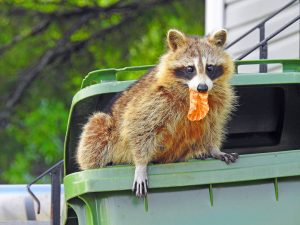ARE RACCOONS DRIVING YOU NUTS?
By Chris Williams on August 17, 2018.
In our Northeast region, it’s the time of year when raccoons are active, and even more active than usual because young raccoons are out on their own, leaving the den with mom, learning how to scavenge for food.
When we get raccoon calls, it’s usually for one of two reasons: raccoons are denning, or attempting to den in chimneys or attics, or they are raiding garbage cans, gardens, bird feeders, and pet bowls on a nightly basis, making a real mess.
FOR YOUR HEALTH, DISCOURAGE RACCOONS
Raccoons forage for food at night and spend their days sleeping in trees, chimneys, attics, or other spaces in buildings. Having raccoons denning in your home or even on your property is the more serious situation because, cute as they can be, raccoons can spread diseases. Raccoons have the potential to become infected and transmit rabies to people and pets, or distemper to unvaccinated dogs.
Of more immediate concern though is the risk of getting raccoon roundworm from contact with raccoon poop. Raccoons’ feces contains the eggs of a roundworm parasite. If people or pets come in contact with the microscopic sticky eggs, they can enter the body from the eyes or mouth, eventually forming internal cysts and causing nervous disorders, eye damage, even paralysis. Part of the problem is that raccoons tend to all poop in the same area which can pose a hazard to children and pets, especially. Don’t attempt to clean up one of these latrine areas on your own without special precautions (see Take Steps to Discourage Raccoons on Your Property).

Shutterstock
DON’T ENTICE RACCOONS WITH FREE FOOD
As we often say about urban wildlife, “If you feed them, they will come.” The lure of a garbage can to a raccoon is obvious, but people don’t realize that they are providing other less obvious food sources as well. Pet food dishes, accumulated birdseed under the feeder, a compost pile, rotting fruits or vegetables in the garden – these are all enticing to a raccoon family. Free fast food, easy to get, no waiting!
Survey your yard for raccoon food sources and eliminate them. Consider moving garbage cans and pet food dishes into the garage, at least at night. For tips on how to discourage foraging raccoons, see Keeping Raccoons Out of Your Garbage Cans.
LET COLONIAL BLOCK RACCOON ACCESS POINTS
At this time of year, we can block raccoons from denning sites in attics and chimneys because young are mobile and no longer totally dependent on mom. Our nuisance wildlife specialists will inspect and then follow up with a raccoon exclusion program that includes sealing openings, capping chimneys, and taking other steps to prevent raccoon access to your home. Give Colonial Pest a call!